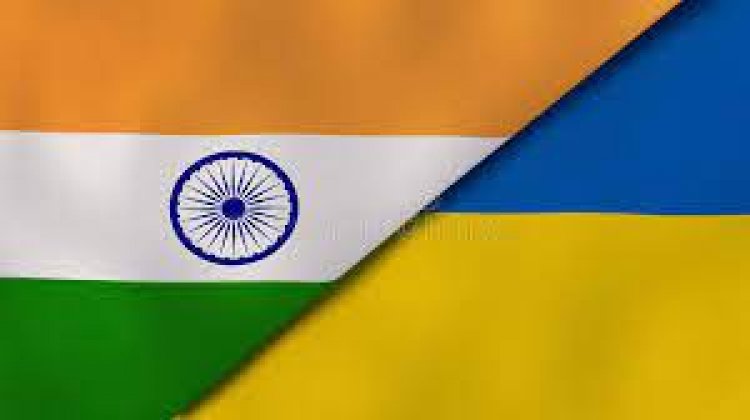India’s Ukraine Dilemma
STORIES, ANALYSES, EXPERT VIEWS

Finance Minister Nirmala Sitharaman, who was on an extended visit to the US, told Bloomberg in Washington on April 23 that while India wanted to be with the 'European Union and the Western, free, liberal world’, it is forced to be with Russia because of Pakistan and China.
India’s strategic limitations
This is a candid admission of India’s strategic limitations. It indicates, writes Parsa Venkateshwar Rao Jr (Senior Journalist) “that India’s heart is with the democratic world of the West, but that it cannot afford to join the club…….it shows India’s vulnerability more than anything else because it means that India is not yet equipped to face the combined challenge posed by a hostile China and Pakistan. And it also means that India is dependent on Russian armaments to deal with the neighbours.”
Signal to the West to address its concerns with China and Pakistan
India’s signal to the West “is that if it wants India to be on its side, it should address India’s concerns with Pakistan and China. That would mean that the West should contain Pakistan and, also, break the China-Pakistan bonding. The West is aggressively anti-China, but it is unlikely to adopt an aggressively anti-Pakistan stance. Whatever problems the West has with Pakistan, it is unlikely to abandon Pakistan in favour of India.
“Russia, too, has been keeping its door open for Pakistan, apart from its close bonding with China. And as India is unwilling to break its close ties with Russia, Pakistan will be unwilling to move away from China, and it would want to get what it can from Russia. The play of balance of conflicting interests is what lies at the base of a multi-polar global politics.
“India is, then, caught in the coils of compulsion and it can be said that the Modi government, like the governments that went before it, is exercising its options within the constraints of strategic imperatives. But it would not be possible for India to speak of ideals and principles, which is what India and Indians would like to do. But a way must be found to reach that relatively open space of strategic freedom, which is hugely different from the strategic autonomy that India is now seeking to exercise.”
Strategic freedom, concedes Rao Jr “will become possible when India can stand on its own feet in terms of science and technology, which leads to economic and military advantage….”
Diplomatic challenges India faces
C Raja Mohan (visiting Research Professor, National University of Singapore) sums up the diplomatic challenges India faces.
“India underestimated the depth of the crisis in the beginning, going by Western assessment that Russia would wrap up the offensive in days. Then India’s focus shifted to evacuating students. As the situation worsened, it needed both Russian and Ukrainian help. In that sense it gave us an opportunity to engage with both sides and use our strategic counterweight. At the UN, India has abstained on resolutions critiquing Russia because we depend on it for weapons, are caught in a conflict with China and cannot afford to lose an old ally. At the same time, India has been harping on executing rule-based order, talking about sovereignty, territorial integrity of Ukraine and the need for a ceasefire.
Dependence on US, Russia, Ukraine: “The Europeans are unhappy, the Americans initially seemed to be equally unhappy. But following the Modi-Biden virtual summit and the 2+2 dialogue, the US understands India’s compulsions and its China problem or that crises in Europe don’t mean that those in Asia have ceased to exist. It has also promised to help India reduce its dependence on Russia. In that sense, it is not just a question of equidistance because today India’s trade with the US and the West is much larger. Just with the US alone, it is about $160 billion. The trade with Russia hovers at around $10 billion. But the Russians control our defence supplies. If Western countries invest and begin to produce weapons in India, then our dependence on Russia can come down over time. Right now, Russia needs to give weapons to itself before it gives them to us. Second, how do we pay the Russians, assuming they can give us supplies, and bypass US sanctions? We have deep dependence on Ukraine as well when it comes to helicopters, engine parts and turbine engines for ships.”
India has been pragmatic: India, says Mohan is “going to see an increased partnership between India and the US on a wide range of issues while the Russian partnership will continue to come under a shadow. Overall, India has come out relatively unscathed though many believe that given China’s salami-slicing tactics, India should have spoken out against unprovoked aggression. We have been pragmatic.”
India is not supporting Russia, it is keeping quiet
India is not supporting Russia, argues Mohan. “We were keeping quiet. We didn’t criticise Russia but we didn’t endorse it unlike China, which said Russia was right. We have a historical relationship with Russia and we have to keep that going. Note that while abstaining, we kept explaining and became more critical of the Russian action in the explanation vote, if not in the actual vote. There is more understanding of India’s concerns in the US at this point in time. That’s the reason why it’s saying it will help India diversify. The US is already a major energy supplier for India. India wants to buy more oil and the US can help. The West is saying it can help India reduce its military dependence on Russia. We’ve not lost much.”
















